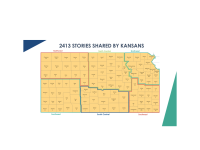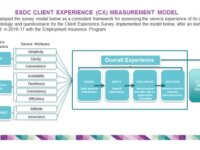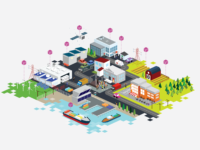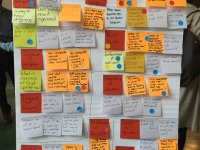Work 2.0 Lab is a new collaborative working and learning environment. It is available to all agencies and civil servants in government and other organisations involved in the 2-years experiment. The purpose is to promote better, higher quality ideas, solutions and decisions on cross-cutting matters outlined for example in the government program. Work 2.0 Lab provides the structures and platforms (environments, spaces, networks, methods) for collaborative learning needed to work together.
Innovation Tag: Futures and Foresight
The State of Kansas piloted ‘Our Tomorrows,’ a novel framework to capture family experiences about thriving and surviving, to ensure that policies and practices meet the needs of families. The approach makes a large amount of data (over 2,500 narratives) directly accessible to decision-makers and the individuals who provided it. Communities make sense of patterns that emerge from stories to create a portfolio of small actions that will make Kansas the best place to raise a child.
Societal challenges such as demographic change affects rural areas in particular. The Social Foresight Lab is an innovative participatory approach towards rural development and technology transfer to address these challenges. It combines foresight, needs assessment and strategy development. Rural areas benefit, as it takes into account regional characteristics, initiates new cooperations among regional stakeholders, and integrates technological and social innovations into regional development.
Make.org est une plateforme européenne de mobilisation citoyenne autour d’actions de transformation de la société. Dans ce cadre, Make.org développe une solution digitale de consultation massive, totalement inédite, capable de faire participer autour d’une question simple d’intérêt général, plusieurs milliers de citoyens, dans plusieurs langues, et de restituer les résultats de cette consultation en ligne, de manière quasi instantanée. Cette solution est complétée des…
The Client Experience Measurement Survey Model was developed by Employment and Social Development Canada to gather and analyse client feedback to improve service delivery to its clients. Canadians have been able to express their views on government programs and services, which have informed the way programs and services are designed and delivered. The survey allows the tracking of service satisfaction, ease of access, effectiveness of service delivery, and the experience of particular programs…
The European Commission led #Blockchain4EU as a forward-looking exploration of existing, emerging and potential Blockchain and other DLTs (Distributed Ledger Technologies) applications for industrial sectors. Through an experimental and participatory approach, this project allowed first to come up with an overview of promising applications across industries, and second to co-design five prototypes that physically showcase how Blockchain could be applied in the near future.
Αugmented Nature is a set of robotic tools that help animals adapt to the mass extinction. The tools enhance the capacities of so called Ecosystem Engineer species to reclaim and change their own habitats.
Canada Beyond 150 was an experiment in leadership development for a diverse cohort of new public servants, with the goal of encouraging a culture shift to a more open and innovative public service. Working in groups part-time over a year, participants learned foresight, design thinking and external engagement methods and applied them to complex policy issues, with a focus on diversity and inclusion. It demonstrated the power of experiential learning, especially from engagement with stakeholders.
Louisville, like many cities, experienced a spike in homicides starting in 2016. Recent deployment of gunshot detection technology has been effective at pinpointing where and when gunshots occur. On average, police officers arrive long after the critical, first ten minute window to stabilize injuries. Placing drones strategically throughout our city, we will be able to deploy a camera to the scene within 90 seconds of when a gun is discharged and rapidly dispatch emergency medical personnel.
AUSTRAC is the first known government law enforcement or intelligence agency to run a global Codeathon forum. AUSTRAC leveraged innovation, collaboration and exploited technology to improve its business operations, develop efficient new solutions in consultation with government partners, industry, academia and the private sector.






